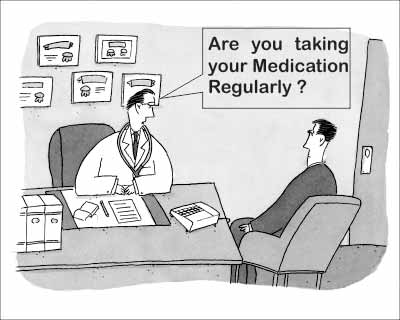- Home
- Editorial
- News
- Practice Guidelines
- Anesthesiology Guidelines
- Cancer Guidelines
- Cardiac Sciences Guidelines
- Critical Care Guidelines
- Dentistry Guidelines
- Dermatology Guidelines
- Diabetes and Endo Guidelines
- Diagnostics Guidelines
- ENT Guidelines
- Featured Practice Guidelines
- Gastroenterology Guidelines
- Geriatrics Guidelines
- Medicine Guidelines
- Nephrology Guidelines
- Neurosciences Guidelines
- Obs and Gynae Guidelines
- Ophthalmology Guidelines
- Orthopaedics Guidelines
- Paediatrics Guidelines
- Psychiatry Guidelines
- Pulmonology Guidelines
- Radiology Guidelines
- Surgery Guidelines
- Urology Guidelines
Doctors Need to Know If Patients Are Skipping Pills: JAMA Study

Many doctors don't have a good way of knowing whether patients are skipping medication doses, new research suggests.
The physicians in the study agreed it's important to talk about medication adherence with their patients but still, the topic rarely came up during office visits.
Doctors may need to explicitly ask patients if they ever skipped medications over the past month in order to get an accurate picture of their adherence, the researchers say.
Most of the doctors admitted they didn't know how often their patients missed doses of their medications, according to a report in JAMA Cardiology.
Dr. Neil Stone of the Feinberg School of Medicine at Northwestern University in Chicago and his co-author Rosemary Hines surveyed 21 doctors and 66 patients at four cardiology practices in Chicago during the summer of 2015.
Overall, 61 percent of the patients said they rarely or never talked with their doctors about how often they took their medications. Eight patients had poor adherence but in only one of those cases did the doctor realize it. Thirty-six patients had only moderate adherence.
About 67 percent of doctors admitted they didn't how often their patients missed medication doses. Yet, they all agreed that medication adherence is an important topic of discussion between doctors and patients.
Research shows that consistently taking heart medications matters. In a study led by Dr. Niteesh Choudhry of Brigham and Women's Hospital in Boston, people who regularly took their medicines after a heart attack were less likely to be readmitted to the hospital for other heart problems.
"What we know in general terms is that people need to take at least 80 percent of their medications," said Choudhry, who was not involved with the new study.
Stone told Reuters Health he hopes the study raises a red flag and that doctors start explicitly asking patients about their medication adherence.
"'Do you take them regularly?' is number one," he said. "Then, 'how many have you missed in the last 30 days?' That tells you what's really going on.”
Choudhry said the results are not surprising, and he likes the idea of asking a simple question.
"We can’t guess if our patients our adherent or not," he said. "We really need to ask them."
Choudrhy said people who don't take their medications may end up having uncontrolled blood pressure or other problems. Doctors who don't realize their patients aren't taking medications as prescribed may prescribe additional medication, which would complicate the problem.
"This idea that we have to emphasize adherence when we want our patient to have good outcomes makes sense," he said.

Disclaimer: This site is primarily intended for healthcare professionals. Any content/information on this website does not replace the advice of medical and/or health professionals and should not be construed as medical/diagnostic advice/endorsement or prescription. Use of this site is subject to our terms of use, privacy policy, advertisement policy. © 2020 Minerva Medical Treatment Pvt Ltd